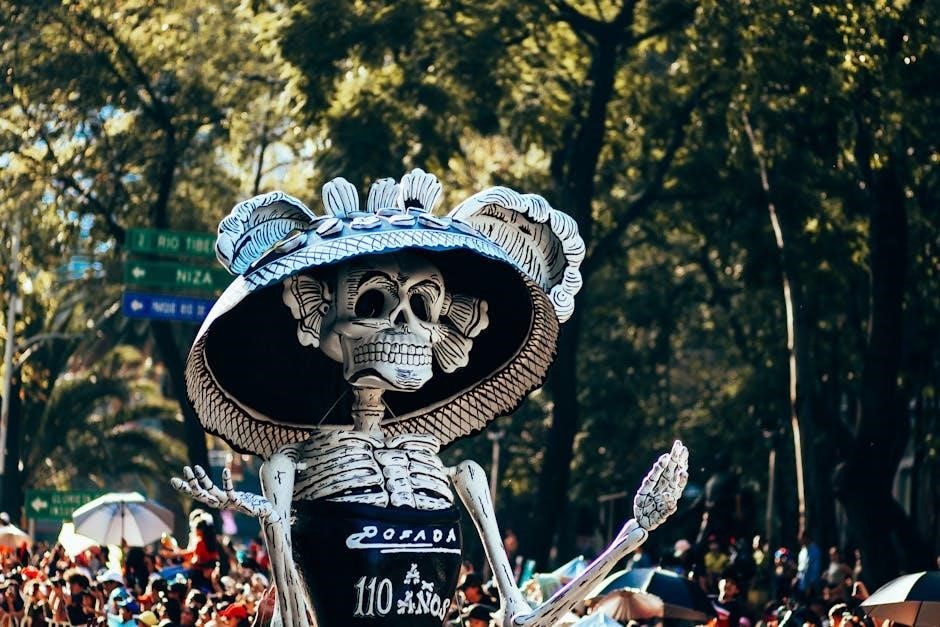This traditional song embodies the spirit of Mexico’s Las Posadas, a heartfelt request for shelter, reflecting deep cultural and religious significance during the Christmas season.
Overview of the Traditional Song
“En el Nombre del Cielo os Pido Posada” is a traditional Mexican song central to the Las Posadas celebrations, which commemorate the journey of Mary and Joseph. The song is a heartfelt request for shelter, sung by participants reenacting the biblical story. Its lyrics reflect themes of faith, hospitality, and community, making it a cultural cornerstone. Available in PDF and MIDI formats, the song is widely shared, allowing people to download and print its sheet music for personal or communal use. This timeless piece embodies the spirit of unity and tradition during the holiday season, connecting generations through its enduring melody and meaningful lyrics.
Cultural Significance in Mexico and Latin America

“En el Nombre del Cielo os Pido Posada” holds profound cultural and religious significance in Mexico and Latin America, deeply rooted in the Las Posadas tradition. This song is a cornerstone of holiday celebrations, symbolizing the universal themes of faith, family, and community. It bridges generations, fostering a sense of unity and shared heritage. The song’s verses are not only a request for shelter but also a testament to the enduring spirit of hospitality and kindness. Its widespread availability in PDF and MIDI formats ensures its preservation, allowing future generations to embrace this cultural treasure. The song’s impact extends beyond music, representing a cherished tradition that strengthens cultural identity and religious devotion across the region.


The Origins of the “Posada” Tradition
The Posada tradition originates from the journey of Mary and Joseph, reflecting early Christian practices blended with indigenous customs, established by Spanish missionaries in Mexico.
Historical Background of Las Posadas
Las Posadas, meaning “The Inns,” traces back to 16th-century Mexico, introduced by Spanish missionaries to blend indigenous traditions with Christian celebrations. The nine-day observance from December 16 to 24 symbolizes the nine months of Mary’s pregnancy. It recreates Joseph and Mary’s journey to Bethlehem, emphasizing community and faith. The tradition includes processions, songs, and reenactments, fostering unity and cultural identity. Over time, Las Posadas evolved, incorporating local customs and music, becoming a cornerstone of Mexican and Latin American Christmas traditions, deeply rooted in religious devotion and cultural heritage.

Religious and Cultural Roots
Las Posadas combines religious devotion with cultural practices, symbolizing the universal themes of hospitality and faith. The song “En el Nombre del Cielo os Pido Posada” reflects the biblical narrative of Mary and Joseph’s search for shelter in Bethlehem. This tradition is deeply rooted in Mexico’s colonial past, blending indigenous customs with Catholic rituals. It reinforces values of compassion, solidarity, and spiritual renewal, making it a vital part of Latin American identity. The intertwining of religious and cultural elements creates a unique celebration that resonates across generations, preserving heritage while fostering community bonds during the Christmas season.

Structure and Lyrics of the Song
The song features a call-and-response dialogue, with the iconic verse “En el nombre del cielo os pido posada” leading the emotional appeal for shelter and faith.
Analysis of the Verse “En el Nombre del Cielo os Pido Posada”
The verse “En el nombre del cielo os pido posada” is a heartfelt plea for shelter, embodying the essence of the Las Posadas tradition. It reflects the journey of the Holy Family, seeking refuge and symbolizing humanity’s universal quest for compassion. The lyrics convey a deep sense of faith and vulnerability, resonating emotionally with listeners. This traditional verse has been passed down through generations, maintaining its cultural and spiritual significance. Its simplicity and sincerity make it a powerful expression of hope and community during the holiday season.

Key Themes and Symbolism in the Lyrics
The lyrics of “En el nombre del cielo os pido posada” revolve around themes of faith, compassion, and community. The repeated request for shelter symbolizes the universal human need for refuge and kindness. The phrase “En el nombre del cielo” emphasizes a spiritual appeal, while the response “Aquí no es mesón” reflects the moral obligation to offer hospitality. The song’s imagery, such as the candlelight and the journey of the Holy Family, underscores the struggle between rejection and acceptance. This duality symbolizes the broader human experience of seeking solace and the importance of generosity. The lyrics also highlight the enduring connection between religious tradition and cultural identity in Latin America.

Availability of the Song in PDF Format
The song “En el nombre del cielo os pido posada” is widely available in PDF format for free download, along with sheet music and MIDI files online.

Where to Find the “Posada” Song in PDF
The “Posada” song, En el nombre del cielo os pido posada, is widely available in PDF format for free download. Websites like MXDC.ORG and other cultural platforms offer the complete lyrics and sheet music. Additionally, MIDI files accompany the downloads, making it easy for musicians to play along. These resources are perfect for personal use or educational purposes, allowing users to print and share the traditional song. The PDFs are easily accessible and provide a convenient way to enjoy this beloved Christmas tradition. Simply search for “Versos para pedir posada” or “En el nombre del cielo os pido posada PDF” to find reliable sources.
Free Sheet Music and MIDI Downloads
Free sheet music and MIDI downloads for En el nombre del cielo os pido posada are readily available online. Websites like MXDC.ORG and other cultural platforms provide high-quality downloads, perfect for personal or educational use. These resources allow users to print the sheet music or play along with the MIDI files, making it easy to learn and perform the traditional song. The MIDI files are particularly useful for musicians to practice or adapt the melody for various instruments. Downloading these files is straightforward, ensuring that the song’s legacy continues to inspire new generations. These free resources are a great way to enjoy and share this beloved Christmas tradition.
This traditional song is a cultural treasure, preserving the essence of Las Posadas. Its lyrics and melody embody the spirit of community and faith. PDF availability ensures its legacy.
Importance of Preserving Traditional Songs
Preserving traditional songs like “En el Nombre del Cielo os Pido Posada” is vital for maintaining cultural heritage and passing it down to future generations. These songs, deeply rooted in history and faith, serve as a bridge between the past and present, fostering a sense of identity and community. By making the lyrics and sheet music available in PDF and MIDI formats, the song’s legacy is ensured, allowing it to continue inspiring and uniting people during festive celebrations. Such efforts not only honor the traditions but also keep the spirit of Las Posadas alive, emphasizing the importance of shared cultural experiences.
Final Thoughts on the Significance of “En el Nombre del Cielo os Pido Posada”
“En el Nombre del Cielo os Pido Posada” holds profound cultural and spiritual significance, embodying the essence of Mexico’s Las Posadas tradition. Its heartfelt lyrics and timeless melody evoke a deep sense of faith, community, and solidarity. By preserving this song, we honor the journey of Mary and Joseph, reflecting on values of compassion and generosity. Its availability in PDF and MIDI formats ensures its reach and accessibility, allowing future generations to connect with this cherished tradition. The song’s enduring popularity underscores its role as a unifying force, bridging past and present while inspiring spiritual reflection and celebration during the holiday season.